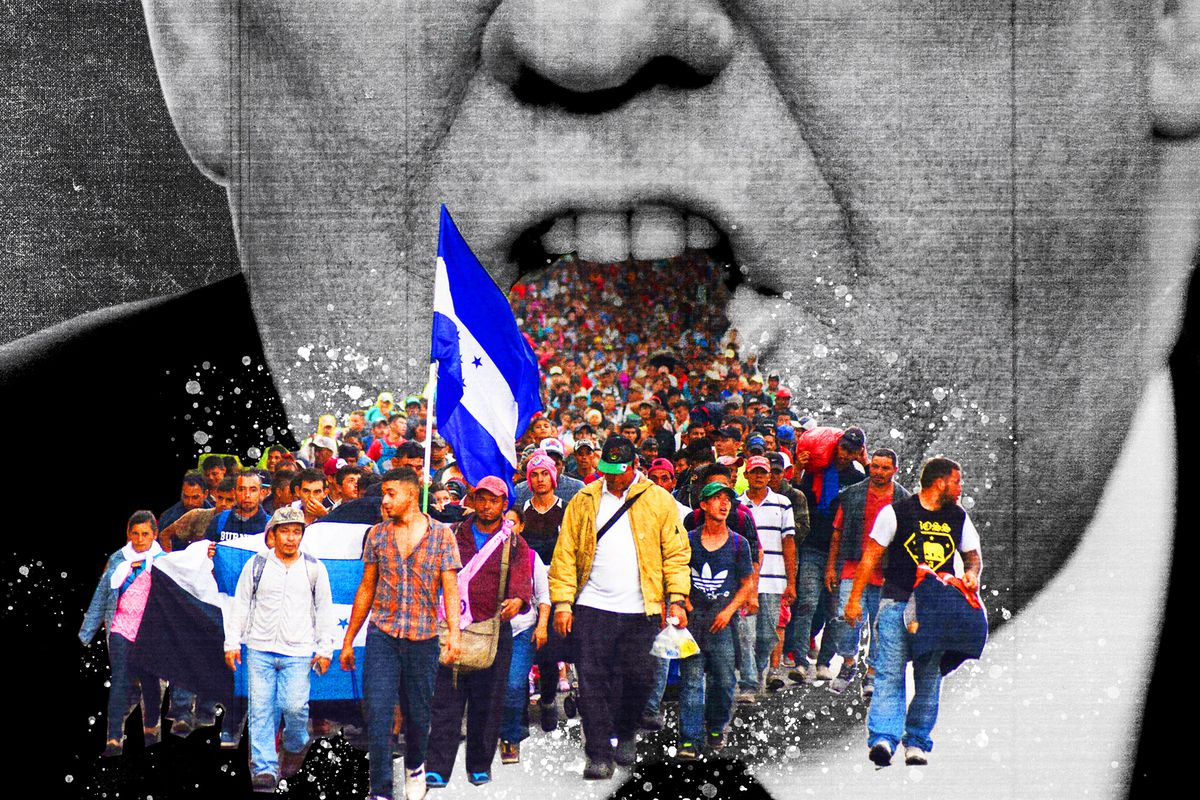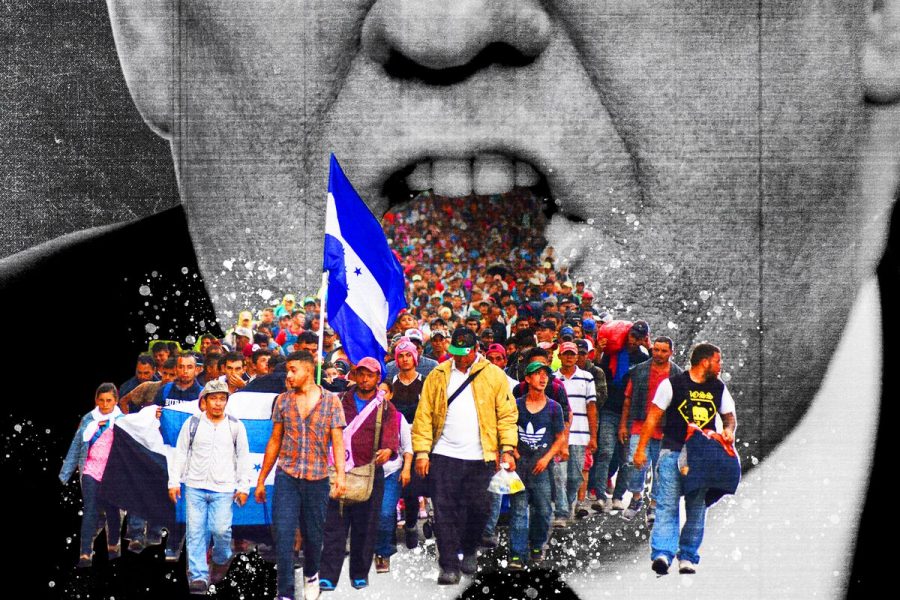Robert Igbokwe
 On Sunday, November 25, 2018, US Border patrol fired tear gas into a group of migrants participating in a peaceful march at the US southern border of Mexico and the United States. The protesters’ goal was to pressure US Customs and Border Protection (CBP) officials to devote more resources to accelerate the slow asylum process. Some migrants began throwing small objects at border police and, as frustration increased, many migrants trying to cross the border and present their asylum case in person attempted to traverse a river of sewage. CBP reacted by firing tear gas into the group of roughly 1,000 migrants. The chaotic situation only escalated as hundreds of migrants, many with young children, attempted to escape the tear gas attack. Mexican officials arrested at least 39 of those migrants and many now face the threat of deportation.
Among the victims of the tear gas attack was Jessica, a wife and mother of two. A video she took shows her screaming at her family to cover their eyes and noses. When the tear gas was released, she and her husband ran like their lives depended on it — but they were not running for themselves. They were running for their two children, both under the age of twelve, gripping them tightly as they tried to keep up. Jessica recalls tearfully apologizing to her daughter for bringing her on the caravan, shocked that this journey would lead to such a frightening and painful experience.
Today, the tear gas is gone but the damage is not. Over 5,800 migrants have taken shelter at a sports-complex just a few miles from the US Border as they wait for the opportunity to present their case for asylum. According the Associated Press, the complex — now filled three times above its capacity — is “squalid and unsanitary.” Piles of trash continue to grow, resources are getting scarcer every day, infection and disease spread rapidly, and children are often found playing in the sewage from the bathing and bathroom facilities. For many migrants seeking safety from the violence back home, the incident has only added to their feelings of degradation and humiliation.
To put it plainly, what the US Border Patrol did to those migrants was morally and legally wrong. While many migrants attempted to illegally cross US border, the border itself was heavily armed and the chances that any of the migrants would cross the border — even in the numbers they arrived in — were slim to none. And according to New York Times, and CBP officials used few if any de-escalation attempts before they began firing the tear gas. The tear gas attack, although not unprovoked, was a blatant overreaction by the CBP.
Moreover, the CBP’s action may have broken international laws. Contrary to popular belief, no migrants were able to cross the border and CBP officials fired tear gas onto Mexican soil. Under Article 2 of the United Nations Charter, countries “shall refrain in their international relations from the threat or use of force against the territorial integrity” of other countries. This clause means that while all countries reserve the right to control who can enter their country, they do not have the right to fire tear gas into another country, especially if before any of the migrants actually made it into the US. Furthermore, the disproportionate use of force against the migrants potentially violates human rights laws. According to Jamil Dakwar, the director of the American Civil Liberties Union, “[Tear gas] is an indiscriminate weapon, and it is not regulated and it is not properly used… force must always be proportional and directed to the seriousness of the threat.” As stated, the migrants posed no real threat of crossing the border and the projectiles they threw caused minor injuries to only four officers. On the other hand, the CBP’s attack ran the threat of causing harm, panic, injury and in some cases death.
Events like this once again pose the question: “what does the United States stand for?” While debates on whether these migrants should even have the opportunity for asylum continue to rage, many Americans forget and therefore minimized the humanitarian crisis occurring just across their border. In doing so, they’ve have allowed the US to not only ignore but contribute to this crisis. And President Trump’s threats to close the entire southern border, violating Article 14 of the Universal Declaration of Human Rights, only worsen this calamity. It’s actions like these that are beginning to define the US in an international context.]]>
On Sunday, November 25, 2018, US Border patrol fired tear gas into a group of migrants participating in a peaceful march at the US southern border of Mexico and the United States. The protesters’ goal was to pressure US Customs and Border Protection (CBP) officials to devote more resources to accelerate the slow asylum process. Some migrants began throwing small objects at border police and, as frustration increased, many migrants trying to cross the border and present their asylum case in person attempted to traverse a river of sewage. CBP reacted by firing tear gas into the group of roughly 1,000 migrants. The chaotic situation only escalated as hundreds of migrants, many with young children, attempted to escape the tear gas attack. Mexican officials arrested at least 39 of those migrants and many now face the threat of deportation.
Among the victims of the tear gas attack was Jessica, a wife and mother of two. A video she took shows her screaming at her family to cover their eyes and noses. When the tear gas was released, she and her husband ran like their lives depended on it — but they were not running for themselves. They were running for their two children, both under the age of twelve, gripping them tightly as they tried to keep up. Jessica recalls tearfully apologizing to her daughter for bringing her on the caravan, shocked that this journey would lead to such a frightening and painful experience.
Today, the tear gas is gone but the damage is not. Over 5,800 migrants have taken shelter at a sports-complex just a few miles from the US Border as they wait for the opportunity to present their case for asylum. According the Associated Press, the complex — now filled three times above its capacity — is “squalid and unsanitary.” Piles of trash continue to grow, resources are getting scarcer every day, infection and disease spread rapidly, and children are often found playing in the sewage from the bathing and bathroom facilities. For many migrants seeking safety from the violence back home, the incident has only added to their feelings of degradation and humiliation.
To put it plainly, what the US Border Patrol did to those migrants was morally and legally wrong. While many migrants attempted to illegally cross US border, the border itself was heavily armed and the chances that any of the migrants would cross the border — even in the numbers they arrived in — were slim to none. And according to New York Times, and CBP officials used few if any de-escalation attempts before they began firing the tear gas. The tear gas attack, although not unprovoked, was a blatant overreaction by the CBP.
Moreover, the CBP’s action may have broken international laws. Contrary to popular belief, no migrants were able to cross the border and CBP officials fired tear gas onto Mexican soil. Under Article 2 of the United Nations Charter, countries “shall refrain in their international relations from the threat or use of force against the territorial integrity” of other countries. This clause means that while all countries reserve the right to control who can enter their country, they do not have the right to fire tear gas into another country, especially if before any of the migrants actually made it into the US. Furthermore, the disproportionate use of force against the migrants potentially violates human rights laws. According to Jamil Dakwar, the director of the American Civil Liberties Union, “[Tear gas] is an indiscriminate weapon, and it is not regulated and it is not properly used… force must always be proportional and directed to the seriousness of the threat.” As stated, the migrants posed no real threat of crossing the border and the projectiles they threw caused minor injuries to only four officers. On the other hand, the CBP’s attack ran the threat of causing harm, panic, injury and in some cases death.
Events like this once again pose the question: “what does the United States stand for?” While debates on whether these migrants should even have the opportunity for asylum continue to rage, many Americans forget and therefore minimized the humanitarian crisis occurring just across their border. In doing so, they’ve have allowed the US to not only ignore but contribute to this crisis. And President Trump’s threats to close the entire southern border, violating Article 14 of the Universal Declaration of Human Rights, only worsen this calamity. It’s actions like these that are beginning to define the US in an international context.]]>
Categories:
Dissecting the Migrant Caravan
December 12, 2018
3
0

















































abolandh2 • Dec 13, 2018 at 6:19 pm
You are such a strong writer, Robert. We’re so lucky to have you on the Forum staff!
obaker • Dec 13, 2018 at 4:45 pm
It’s hard to put into words how much I appreciate your thorough research, Robert. This is an excellent piece!
lcampbel • Dec 13, 2018 at 2:26 pm
“Today, the tear gas is gone but the damage is not.” Wow, Robert. Your articles never fail to amaze me. They’re both informative and engaging. Keep up the great work.